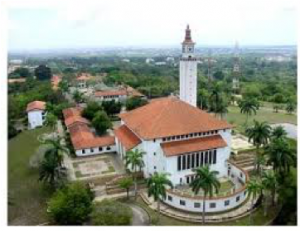 3rd Ghana Studies Triennial Conference
3rd Ghana Studies Triennial Conference
‘GHANA AS CENTER’
University of Ghana
10-13 July 2019
Geographically, Ghana is at the center of the world where the Greenwich Meridian meets the Equator. Conceptually, Ghana can be said to be at the center in regards to important themes in the study of Africa, such as pan-Africanism, the trans-Atlantic slave trade, colonialism, state-building, and development, with their attendant themes of power, materiality, and modernity. At the third triennial conference of the Ghana Studies Association, we engage with what it means to have Ghana truly at the center of African/Ghana Studies scholarship.
As currently constructed, ‘the terms of global intellectual exchange, like the terms of trade … are decidedly unequal’, Paul Zeleza observes. ‘Since the colonial encounter, the construction of scholarly knowledge about Africa has been internationalized…in the sense of…the inordinate influence of externally generated models on African scholarship.’[i] In his 1963 speech at the launch of the Institute of African Studies (IAS) at Legon, Kwame Nkrumah asserted a very different vision of knowledge production in African Studies. ‘One essential function of this institute’, he declared, ‘must surely be to study the history, culture and institutions, languages and arts of Ghana and of Africa in new African centred ways’[ii]. As Jean Allman argues, the establishment and direction of IAS ‘placed Ghana at the very center of efforts…to re-imagine knowledge production about Africa globally and on African terms’.[iii]
Recognizing Ghana at the center invites scholarship that takes Ghanaian models and concepts as a starting point. It also implies seeing Ghana as both unique and global, not ‘a place apart…[but] a site for the generation of ideas and theoretical insights’[iv] as well as methodological innovations. What might we contribute to political science if we questioned Western state formation as the standard model by which to assess state-building in Ghana and Africa? Could we utilize Ato Quayson’s methodology of ‘horizontal archaeologies’ as applied to Oxford Street in Accra to explore postcoloniality and globalization in other cities? Would we gain new perspectives on economics through the economic ideology of the Akan brought out in Gracia Clark’s ethnographic work? How much more relevant might development studies be if there were a shift in focus from sophisticated but empirically-flawed abstractions[v] to what Agnes Apusigah refers to as ‘street evidence’?[vi]
While we encourage proposals that engage with this theme, we welcome proposals on other themes or topics. Papers may be in any discipline or area of study, and may be submitted by established scholars, early career faculty and graduate students. We especially encourage papers produced collaboratively by scholars in different disciplinary and geopolitical locations.
Submissions may be in respect of
- panels
- individual papers
- roundtables
- special sessions for graduate students
- documentaries, films and presentations that are visual- and performance-based or that make use of digital media
Sub-themes
- Knowledge Production and Theorizing ‘Ghana as Center’
- Colonialism, Nation-building and Citizenship
- Globalization, Pan-Africanism and the Diaspora
- History, Anthropology and Archaeology
- The State, Political Leadership and Elections
- Literature, Popular Culture and Social Media
- Theater, Music and the Visual Arts
- Religion and Spirituality
- Gender and Sexualities
- Youth in Ghana: Past, Present and Future
- Mobilities (Migration and Transportation)
- Education, Employment and Development
- Science, Medicine and Health
- Special topics
Timelines:
EXTENDED Deadline for abstracts: 31 January 2019
Notification of acceptance: 15 February
Registration fees:
GSA members $100 (students – $30)
Non-members $120 (students – $40)
Day pass $30 (students – $10)
Accommodation: Participants will be responsible for their own accommodation. GSA will, however, provide information on available lodgings in the vicinity of the university.
FOR INQUIRIES or to report issues with the submission forms or processes, email: ghanastudies@gmail.com
——————————–
[i] Paul Tiyambe Zeleza, ed. (2007). The Study of Africa, Vol. 2: Global and Transnational Engagements. Dakar: CODESRIA, p. 2.
[ii] Nkrumah, K. (2012). The African genius. In H. Lauer & K. Anyidoho (Eds.), Reclaiming the human sciences and humanities through African perspectives (Vol 1) (pp. 909–917). Accra: Sub-Saharan Publishers (Reprinted from Kwame Nkrumah, The African Genius: Speech Delivered by Osagyefo Dr. Kwame Nkrumah … at the Opening of the Institute of African Studies, 25th October 1963. Accra: Government Printer, 1963, p. 910).
[iii] Allman, J. (2013). Kwame Nkrumah, African Studies, and the politics of knowledge production in the Black Star of Africa. International Journal of African Historical Studies, 46(2), 181–203.
[iv] Abrahamsen, R. (2016). Africa and international relations: assembling Africa, studying the world. African Affairs, 116/462, 125–139. https://doi.org/10.1093/afraf/adw071
[v] De Waal, A. (2018, March 10). African academics face a huge divide between their real and scholarly selves. The Conversation. Available at www.theconversation.com
[vi] Apugisah, A. A. (2012). On Ghanaian development: technical versus street evidence. In Reclaiming the Human Sciences and Humanities through African perspectives(pp. 388–412). Accra: Sub-Saharan Publishers.